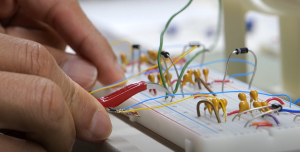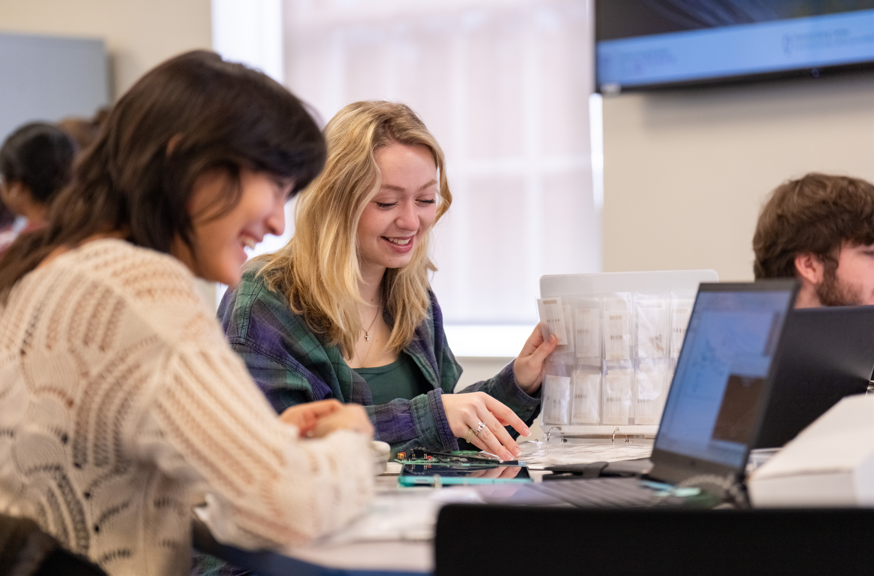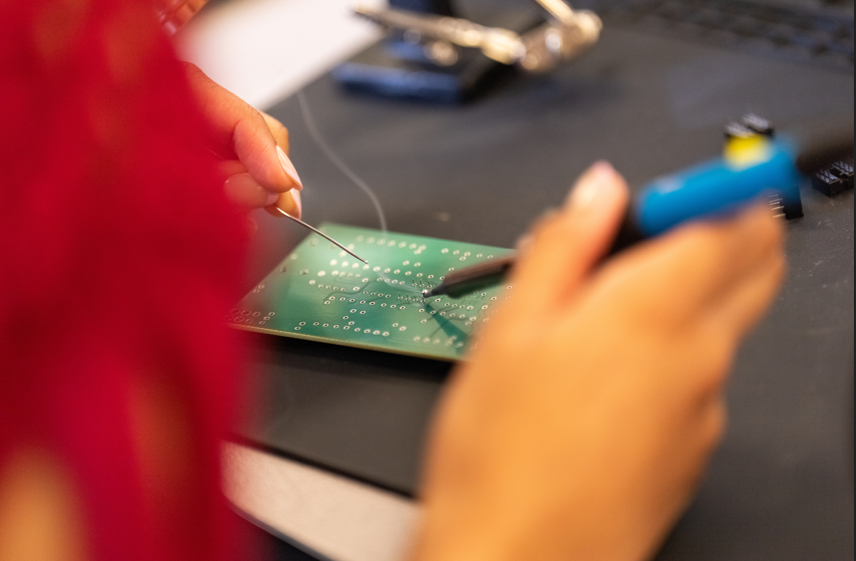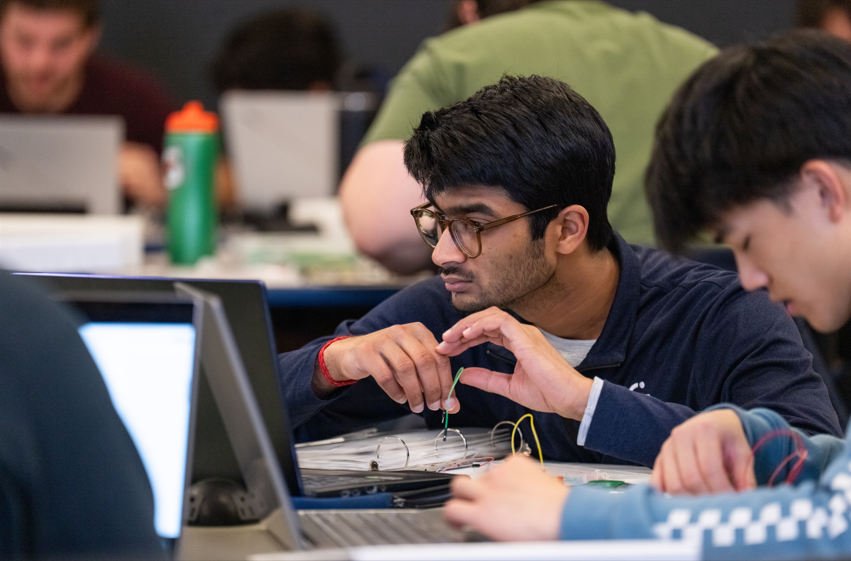ECE Core Undergraduate Curriculum

Course planning resources
Feel free to use these to help plan your course schedule
Core ECE Courses
Embark on an exciting journey through electrical and computer engineering with our foundational courses, all of which are available every semester. These courses are designed to ignite your curiosity, give you hands-on experiences, and give you a broad basis of electrical and computer engineering.
These courses are required for both the electrical engineering and computer engineering undergraduate degrees.
Full degree and minor requirements can be found in the UNDERGRADUATE RECORD.
We live in a world where electronic devices are ubiquitous. They operate your phone, computer, car, and coffee maker, but do you know how they work? It isn’t magic and yet most people have little idea how they function much less how to go about designing them. This course will provide you with a foundation for exploring electrical and computer engineering, where you will learn how to analyze and build electronic circuits that are the backbone of our society today. You will learn not only the underlying circuit theory but also hands-on laboratory techniques and the engineering communication skills that are crucial for the complex design problems facing the modern engineer.
This course assumes no prior exposure to electrical engineering theory. Feel free to sign up if you are curious about electrical and computer engineering! Most students find they spend a decent amount of time on this class per week given the amount of material that the course covers.
This course includes hands-on experiences and you will typically spend one class session each week designing, building, and verifying the circuits covered in lecture. You will use the Analog Discovery 2, which the department loans out to students for the duration of the core course sequence.
Prerequisite: Must have completed APMA 1110 (Calc 2) and ENGR 1010 (Engineering foundations 1)
Quotes from past course evaluations:
- "I highly enjoyed my experience in Applied Circuits and feel more excited than before about my prospective academic journey in electrical engineering."
- "I came into this course with barely any prior knowledge and experience with circuits and I remember feeling very nervous when I did not have any clue how to do the first lab. I feel like this class gave a very good introduction into circuit analysis and physically building circuits on the breadboard."
- "I really enjoyed Applied Circuits because it gave me a strong hands-on introduction and understanding of how electrical components work together in real-world applications. The labs were especially engaging and helped reinforce the concepts we learned in lectures."
- "I enjoyed the course. It was one of the faster paced classes I've taken but probably one of the classes I've learned the most from. Overall, I'm glad I took the course and found it highly educational."
What will you learn? By the end of the course, you will...
- Use fundamental circuit laws to analyze a circuit (the magic behind the curtain).
- Be able to break down a complex circuit or system into simpler parts for analysis (this is more useful than you may realize).
- Utilize good laboratory procedure when measuring, testing, and recording results (the fun hands-on part).
- Be able to clearly explain an experiment, from the theory to the setup to the presentation data and results in a concise and understandable format (yes, communication is an engineering skill as much as math).
- Be able to coordinate and communicate with peers on a lab or project (because modern engineering is a team sport).
- Recognize the value and limitations of engineering models (using the right tools for the job).
- Recognize how we use circuits in everyday life (where the magic happens).
From a topics standpoint, we will examine:
- Electrical quantities (units, power, & energy)
- Resistive circuit analysis (Ohm’s law, KCL, KVL, series & parallel, volt & current division)
- Systems of equations (node & mesh, applying linear algebra)
- Network Theorems (Thévenin, superposition)
- Operational Amplifiers
- RC, RL, and RLC Circuits utilizing differential equations with constant forcing functions
- Phasors
- Complex impedance and circuit analysis
What is the course structure? Circuits has a mix of traditional lecture-based content with associated homework assignments and a studio-section where we complete hands-on activities during class. There are typically two midterms and a final as well as a group-based class project.
ECE2330 (Digital Logic Design) introduces you to the analysis and design of digital systems from switches to gates to a simple CPU.
Prerequisite: None
Quotes from past course evaluations:
"This class was an interesting introduction to a lot of concepts for me. Entering with very little knowledge of the material, I was still able to learn and complete the assignments."
- "The hands-on learning activities really cemented the course concepts for me."
What will you learn? The analysis and design of combinational and sequential components includes multiplexers and demultiplexers, decoders and encoders, comparators, adders and ALU, registers and register files, counters and timers, RTL design, culminating in the design of a simple computer system.
DLD is a great entry course if you are at curious about ECE, especially if you are debating computer engineering or computer science. We do not assume any specific prerequisite knowledge as this is an entry-level course, so feel free to give it a try!
What is the course structure? The course schedule is structured around the design of a simplified computer system, using a "hardware description language." Throughout the semester, you complete learning activities that provide the knowledge and skills needed to build a simple computer system design. For each portion of the computer system design, you will develop an analytical design that satisfies the requirements, and then numerically verify that the circuit you specify satisfies the requirements with a digital circuit simulator. We spend some class sessions lecturing on new material and other class sessions working together on these learning activities. There are also a handful of textbook homeworks and typically two exams.
Electronics shape our lives every day in numerous ways, from cell phones, to the computer systems in cars, to WiFi networks that connect you to the internet. The electronics industry is global, with designers, fabrication facilities and consumers located around the globe. The pace of change in the field of electronics is very rapid, both at the device and system levels. It is almost certain that the devices that we study in this course will undergo significant improvements in both power handling and miniaturization by the time you graduate, and there is a strong possibility that we will see new "everyday" devices over this same time period.
To be successful as an engineer in this field, it will be important to learn to understand devices that they may not have been previously familiar with and be able to apply them to previously unseen problems. One of the "big picture" goals of this course is to develop approaches for dealing with new, possibly incomplete data, and to integrate this understanding into the design of systems not previously seen in a traditional lecture-based environment.
Unlike the analysis of passive circuits you learned about in the applied circuits course, the analysis of circuits that employ active devices is a very non-linear process; frequently, no closed form solutions are possible. Thus, we use simplifying models and simulations. Unfortunately, both are approximations, and may not be totally applicable under all circumstances. Understanding modeling and simulation - both strengths and limitations - is another of the "big picture" goals of this course. In this course we will address the fundamental operation, characteristics, and design of circuits that power all the devices we use every day through a mixture of traditional lecture presentations and learning activities that include analysis and design problems solved in a group and laboratory environment.
Pre or Corequisite: APMA 2130 ODE and ECE 2700 Signals and Systems. Prerequisite: ECE 2300 Applied Circuits.
Quotes from past course evaluations:
- "I really liked the course overall especially the satisfaction of building the final project. It was a lot of work though."
- "This course was one of the best courses I have ever taken in my educational career simply because of the project-based learning, the clear lectures which broke down complicated concepts into simple terms, and the amazingly supportive team of TAs and professors that were available to guide my learning."
What will you learn? By the end of the course, you should be able to:
- Identify and describe the functionality and behavior of various electronic components such as resistors, capacitors, inductors, transistors, diodes and op-amps.
- Analyze, describe, and solve, simple DC and AC circuits using Ohm’s law, Kirchhoff’s laws and basic network theorems.
- Utilize electronic measurement instruments, such as multimeters and oscilloscopes to measure, verify and debug circuit functionality.
- Evaluate the effectiveness of an electronic circuit to perform a specific function using figures of merit, and communicate the relative merit of different designs.
- Determine the limits and usefulness of various models and approximations.
- Design and construct a project.
- Appreciate how electronic circuits enable a variety of critical applications.
- Demonstrate written technical communication skills.
What is the course structure? The course is broken up into a series of modules, each with a similar structure of activities and assessments and most lasting 1 week. To make the most of the in-class synchronous time, much of the lecture material will be delivered online and asynchronously via videos that you watch before coming to class. Most of the in-class time is then spent on hands-on learning laboratories and a semester-long project. Homeworks are designed to be completed during class time with the help of teaching assistants.
Photos from the 2025 Fall section of Electronics

How do robots use computer vision to identify objects in a scene? How does cruise control keep a car at a constant speed despite changing environmental conditions? How do machine learning systems like convolutional neural networks (CNNs) classify pictures of cats? These are all applications of signals and systems concepts!
In this course, we will introduce signals and systems concepts, concentrating on modeling linear and time invariant systems and understanding their properties from a variety of perspectives. This journey will largely consist of learning mathematical techniques then applying those to analyze real-world systems.
Pre or Coreq: APMA 2130 ODE. Prerequisite: ECE 2300 Applied Circuits.
What will you learn?
Primary concepts are the representation of signals and linear systems in the time domain (convolution, differential equations, state-space representation) and in the frequency domain (Fourier/Laplace analysis) including practical programming examples.
By the end of this course, you should be able to:
- Define and categorize signals into types (continuous, discrete, analog, and digital) and systems into their properties (linearity, time-invariant, causal, stable).
- Recognize and be able to manipulate commonly used signals, e.g., the unit step, ramp, impulse function, sinusoids, and complex exponentials.
- Use common mathematical techniques to analyze systems. In S&S, this will take the form of analyzing novel systems, including finding input-output relations, and describing the implications of their properties. This will involve using tools such as convolution, Fourier analysis, and the Shannon-Nyquist sampling theorem.
- Determine the limits and usefulness of models and approximations.
- Relate characteristics in the time domain to characteristics in the frequency domain using qualitative and quantitative reasoning.
- Demonstrate how signals and systems theory is applied to practical engineering problems in areas such as communications, audio processing, image processing, and control systems. This will include coding in python.
- Use documentation for a library function to integrate the third-party function into a program.
- Find value in modeling real-world systems as linear and time invariant.
What is the course structure? The course is lecture-based with textbook readings and homeworks due roughly every other week throughout the semester. There are typically two midterms and a final exam. There is also an end of semester project where you will get to show how some concept from the course applies to a real-world problem of interest to you.
See an example end of semester project video here: https://www.youtube.com/watch?v=FZTRxNDd-bs
Whether you realize it, you interact with embedded systems every day. For example, you may be wearing an embedded system, although you probably refer to it as your watch. If you own an automobile, it contains several embedded computers controlling its basic operation, even something as seemingly mundane as the music you listen to on the radio. If you stop for gasoline, then yet more embedded systems – like the gasoline pump, the payment system – the list goes on and one.
Embedded systems have permeated your environment to the point that their ubiquity has made them practically transparent. But like with any technology, transparent pervasiveness produces the requirement for engineers to design complex systems that are also dependable. To do so requires a systematic, strategic approach to design, which includes the ability to test the design solution (which may require troubleshooting to diagnose and mitigate issues) to ensure that 1) you designed the correct system, and 2) you designed the system correctly. During this course, you will develop such an approach for designing embedded systems.
Prerequisites: ECE 2300 and ECE 2330 and CS 2130
What will you learn?
This course explores architecture and interface issues relating to the design, evaluation, and implementation of embedded computer systems. Topics include hardware and software organization, power management, digital and analog I/O devices, memory systems, timing, and interrupts
What is the course structure? This is a lab-based course that emphasizes project work. Much of your time will be spent in group labs working on learning activities that build toward a final project. There is typically a midterm and final exam, often project-based.
Our Capstone is where our students shine! Check out how capstone works and some previous capstone projects on our ECE Capstone page.
Prerequisites ECE 3430 and ECE 2700 and 4th year standing
Many of our undergraduate students enjoy their courses so much they decide to become teaching assistants (TA). Hear what some of our undergraduate TAs like about our curriculum.
What our students say ECE 2330: Digital Logic Design
"What I enjoy most about DLD is that it brings out your creativity and problem-solving skills. You can model a lot of things with just 1's and 0's." - Jeffrey Owusu, DLD TA Spring 2024-Fall 2025

ECE 2600: Electronics
"I enjoyed the electronics class because it allowed me to get a deeper, more fundamental understanding of electronic circuits beyond the intro course. The hands-on activities and lectures strengthened my design and experimental skills by introducing me to more complex systems. My favorite part was designing an audio analyzer as our final project. " - David G. Merino, Electronics TA Spring 2024

ECE 2600: Electronics
" My favorite part about Electronics is how hands-on it is! Working with a breadboard during every class session and on every assignment really solidified my knowledge of the theory we learned in class. Then, getting to leverage all my new skills to build the audio analyzer final project made Electronics a very rewarding and cohesive class." - Simone Borin Electronics TA Spring 2024-Fall 2024

ECE 3430: Introduction to Embedded Computer Systems
"I enjoyed exploring embedded systems because they offer a fascinating intersection between software and hardware, revealing how they collaborate to perform diverse functions. I was also intrigued by its wide range of applications in contemporary technology, from the Internet of Things to consumer electronics, showcasing the versatility and potential of embedded systems." - Daniel Sarria, Embedded TA Fall 2024

ECE 2330: Digital Logic Design
"To be honest, the concepts I learned from DLD have followed me throughout every single one of my CpE classes. Because of this, I can confidently say DLD helped me to build a great foundation for all things electrical, which I am forever grateful for." - Joyce Park, DLD TA Spring 2024-Fall 2024
Core EE Courses
In addition to the shared courses with the computer engineering majors, electrical engineering majors are required to take ECE 2410: Intro to Machine Learning.
Learn about and experiment with machine learning algorithms using Python. Applications include image classification, removing noise from images, and linear regression. Students will collect and interpret data, learn machine learning theory, build systems-level thinking skills required to strategize how to break the problem down into various functions, and to implement, test and document those functions.
Prerequisite: CS 111X
Student testimonial:
" As a BSCS student, this was my first AI/ML course I took at UVA. I enjoyed how the course focused on both the applications and mechanisms behind machine learning concepts, which culminated into a fun end-of-semester project (I made a ML model that can play Tetris!). Additionally, the class is also sprinkled with snippets of more advanced topics such as neural networks and large language models, along with recommended research papers that I explored to further fuel my fascination. Come to office hours!" - Austin Trinh, Intro to ML TA Fall 2024
Core CpE Courses
In addition to the shared courses with the electrical engineering majors, computer engineering majors are required to take ECE 4435 Computer Architecture & Design. Read more about the other requirements for the computer engineering degree, including CS courses, on the B.S. in Computer Engineering page.
Introduces computer architecture and provides a foundation for the design of complex synchronous digital devices, focusing on: 1) Established approaches of computer architecture, 2) Techniques for managing complexity at the register transfer level, and 3) Tools for digital hardware description, simulation, and synthesis. Includes laboratory exercises. Prerequisites: ECE 2330 Digital Logic Design and CS 2130 Computer Systems and Organization 1.
Student testimonial:
"Computer Architecture is a must for students to understand the high-level architectural implications of circuit design. Prof. DeLong does an excellent job of taking concepts from DLD and showing how they translate into implementing a full CPU, and then showing how the design can be modified to include certain important design elements." - Student from Computer Architecture, 2024
FAQ for current students
Check out our page on ECE electives for some ideas!
No, you do not need ECE 2200 if you have Physics 2 credit either from transfer credit or from taking PHYS 2410 and 2419 at UVa. If you have not taken Physics 2 yet, we highly recommend taking ECE 2200 - our students enjoy the class and you will have an ECE instructor.
Please see the answer on the CS advising webpage here:: https://uvacsadvising.org/courses.html#which-cs1-course-should-i-take
Yes. So does linear algebra, which most of our faculty highly recommend.
You can search the Archived Records page for more past requirements or to find the records page for other majors. Here are some recent years:
Useful links
Questions? Comments?
Please reach out!

Keith Williams
Williams' completed my Ph.D. in materials physics at Penn State University in 2001, and undertook postdoctoral research in the Molecular Biophysics Group at the Delft University of Technology in the Netherlands, thereafter establishing a nanophysics laboratory in the physics department at the University of Virginia.


